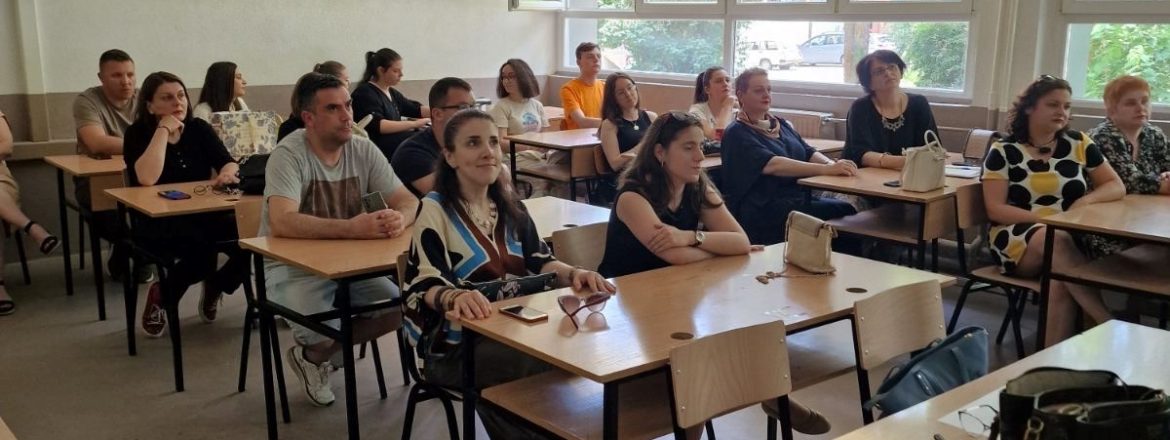
In a significant stride toward advancing STEM (Science, Technology, Engineering, and Mathematics) education in an online environment, a successful multiplier event was held in Bitola, North Macedonia, on June 28, 2023. The event was orchestrated by the Medical High School “Dr. Jovan Kalauzi” as part of the Erasmus Plus project: “Innovative methods, approaches and practices for effective teaching stem in an electronic environment” [2020-1-BG01-KA226-SCH-095199].
This impactful event aimed to foster the transfer of educational innovations for teaching natural sciences and STEM subjects in an online setting to representatives from other educational institutions, including those operating at the pre-gymnasium and gymnasium levels. In addition, it sought to reach organizations and institutions directly engaged in the field of school education to help address the challenges posed by the recent, abrupt transition to online and distance learning during the global COVID-19 pandemic.
The event was a focal point for educators, teachers, and professionals who were not part of the project but worked within the pre-gymnasium and gymnasium educational sectors. It also attracted representatives from organizations and institutions, especially those hailing from less-developed regions like Southwest Macedonia with a focus on Bitola, deeply committed to school education. Attendees included educational specialists, leaders in the field of education, as well as representatives from various sectors connected to school education, all eager to gain a comprehensive understanding of the developed educational innovations for teaching natural sciences and STEM in an online environment.
The day’s activities were thoughtfully organized into several components, which showcased the innovative outcomes of the project:
- Presentation of the Online Educational Platform: The event commenced with a detailed presentation of the project’s intellectual output – an online educational platform. This platform was designed to provide access to innovative online resources for teaching natural sciences and STEM subjects, complete with interactive guidance for educators. Attendees delved into the platform’s features and resources, exploring how they could be seamlessly integrated into online STEM teaching.
- Demonstration of Innovative Online Resources: The attendees were treated to a presentation and practical demonstration of the developed innovative online resources. These resources included exercises, experiments, and related video materials. Attendees learned about the integrated innovative online resources, their descriptions, instructions, and innovative video resources designed to elevate the educational experience, building upon identified best practices from the project’s three partner organizations.
- Online Teaching Manual: An online teaching manual, which is an integral component of the developed platform, was also unveiled. The manual offers comprehensive guidance on teaching STEM subjects and conducting laboratory exercises in online and blended learning environments. It provides educators with the means to leverage the innovative online resources effectively.
- The Role of the Intellectual Output: The event provided insights into the pivotal role of the developed intellectual product in achieving effective and motivating learning outcomes while delivering quality and inclusive education online, with a particular focus on the natural sciences.
- Demonstration Sessions: The day featured group demonstration sessions where specific experiments and laboratory exercises suitable for building digital skills and teaching natural sciences in a digital environment were practiced. This hands-on approach allowed participants to gain practical experience.
The event played a crucial role in furthering the cause of STEM education in an online setting, enabling educators and institutions to tap into innovative teaching methods and resources. It was a testament to the commitment of the education community in Bitola, North Macedonia, in adapting to the challenges brought about by the transition to online and distance learning.
This project is financed with the support of the European Commission. This publication reflects only the personal views of its author and the Commission cannot be held responsible for the use of the information contained therein.





